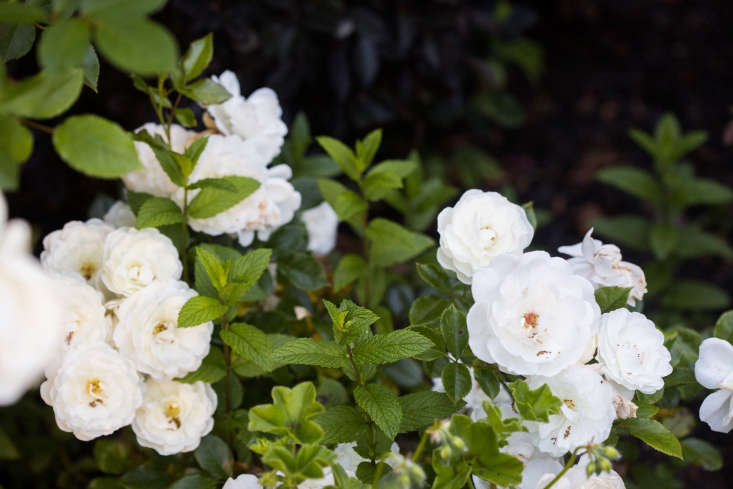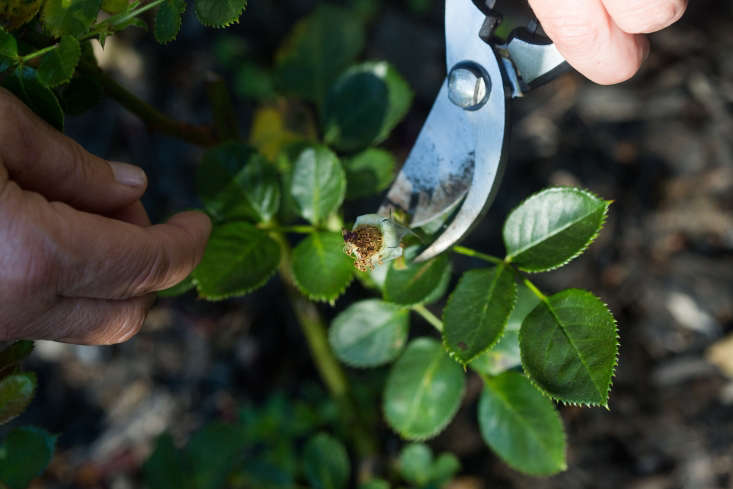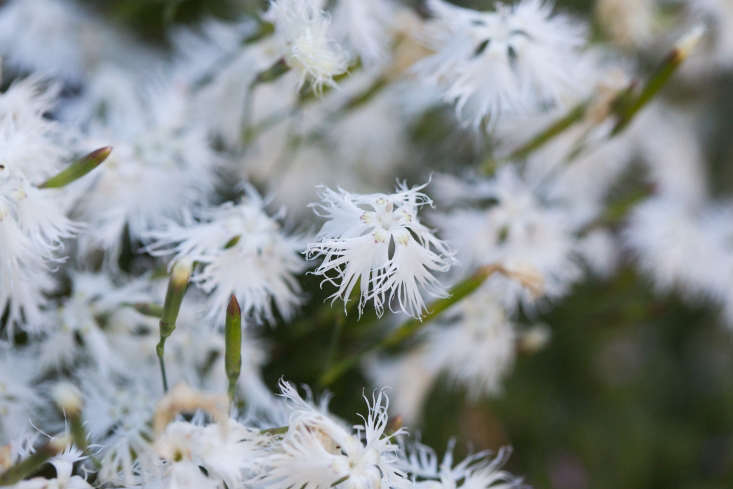A rose garden was not part of the plan when we remodeled our house. And certainly not an instant rose garden. I did not wake up one morning and think, “Today would be a good day to fill the garden with roses purchased in a panic from a big-box store.” That came later.
First came the mud. After the remodel there were paw prints all over the newly refinished hardwood floors (did I mention we have two little dogs?). The origin of the mud—and of a great cloud of dust that settled like gray powdered sugar on the just-painted windowsills—was the backyard, which was in a post-construction state of apocalypse: barren earth tattooed with tread marks from the contractor’s front end loader.
To get rid of the mud and dust, something had to be done—something very, very cheap—to reclaim the garden. My husband and I were in a state of post-remodel sticker shock, loath to spend more money (as if we had more money), and for some weeks had been building meals around a cache of canned goods discovered when unpacking the moving boxes. One night, over a nice dinner of Green Giant creamed corn, we set a budget of $250 for plants.
The next day I headed to Home Depot, planning to buy some sensible shrubs. Instead, I came home with 16 roses:
Photography by Mimi Giboin for Gardenista.

With a budget of $250, why roses? Well, for one thing I adore roses. And despite their reputation for being finicky and prone to disease, some roses are workhorses. Shrub roses and climbers—the kind that big-box stores sell in their nurseries—will grow big, and they will grow fast, if you give them sun and water (and a little fertilizer now and then).
So when I saw the puffy, pillowy white roses blooming their heads off at Home Depot, I had this epiphany: I have seen the future of gardens, and it is white roses.
A tip: If you are planting a rose garden on a budget, limit the palette to a single color. This is easy because big-box stores sell mostly white roses, red roses, or pink roses. With the occasional yellow rose. I chose only white roses, because a monochromatic scheme tricks the eye into thinking the garden beds are exploding with flowers (as opposed to having one red rose next to a pink rose next to a white rose, all three of which look lonely).

At Home Depot, prices ranged from $12 to $18 per rose and I bought 16; with tax, the total came to $261.74—slightly over budget, but so much less so than other aspects of the remodel, that I felt in some perverse way as if I had saved money by spending it.

Here’s a sampling of Iceberg roses—sizes and prices—that I found online last week:
- Iceberg in a 3-inch pot, $22.95 from Rogue Valley Roses.
- Climbing Iceberg Rose in a 2-quart pot; $28.95 at Jackson & Perkins.
- Rose Iceberg in a 1-gallon pot; $29 from White Flower Farm.
- Iceberg Floribunda bare-root rose; $29 from David Austin.



The first year, when all we had was roses, the garden was so pretty. The Iceberg roses grew quickly and began to bloom prolifically. The New Dawn roses covered the fence and more; they spilled over at a height that partially blocked the neighbors’ satellite dish. Although my New Dawn roses are not repeat bloomers, their glossy green leaves created a nice backdrop to the Iceberg roses.
In later years, I added other plants to the back garden, but on the whole have tried to limit the palette to white. (Because it is a small, suburban backyard, a single color makes the space feel bigger.)

Last year I was at Annie’s Annuals in the East Bay and found feathery white dianthus, which is spreading at the base of the Iceberg roses, hiding their legginess as the canes get older and thornier.

Last year I planted a pair of white pelargoniums beneath the cloches; the flowers grow through the frame in a charming way. The ground cover is creeping thyme and yes, I let my mint grow wild despite warnings from everyone I know. It provides cover for the roses.

New Dawn roses are readily available. Last week I found them for sale at a variety of online shops, including:
- A New Dawn rose plant is $22.95 from Antique Roses Emporium.
- A New Dawn rose in a 1-gallon pot is $39 from Heirloom Roses.
- New Dawn Rose; $29 for a bare-root plant, available seasonally, from White Flower Farm.

Five years after planting my big-box roses, they all are still alive—and thriving. My friends Greg and Rahel are here tonight for dinner and Greg (not a gardener) just looked out the window and said, “What is growing out there? It is so beautiful.”
There are drawbacks to my approach, of course. My snowy roses have no fragrance, which is very sad. And I deeply covet the roses I used to grow when I lived on Long Island and had a different sort of garden. I miss pink Zepherine Drouhin most of all, and maybe one day I will carve out a corner of the garden for pink.
Are you thinking of planting a rose garden? See some of our favorite inspirations at:
- Grandeur in the Hamptons: A Sunken Estate, Sprawling Rose Garden Included.
- Garden Visit: The Last Word in Roses from the Royal Horticultural Society.
- The 7 Best Climbing Roses for Your Garden.












Have a Question or Comment About This Post?
Join the conversation (2)